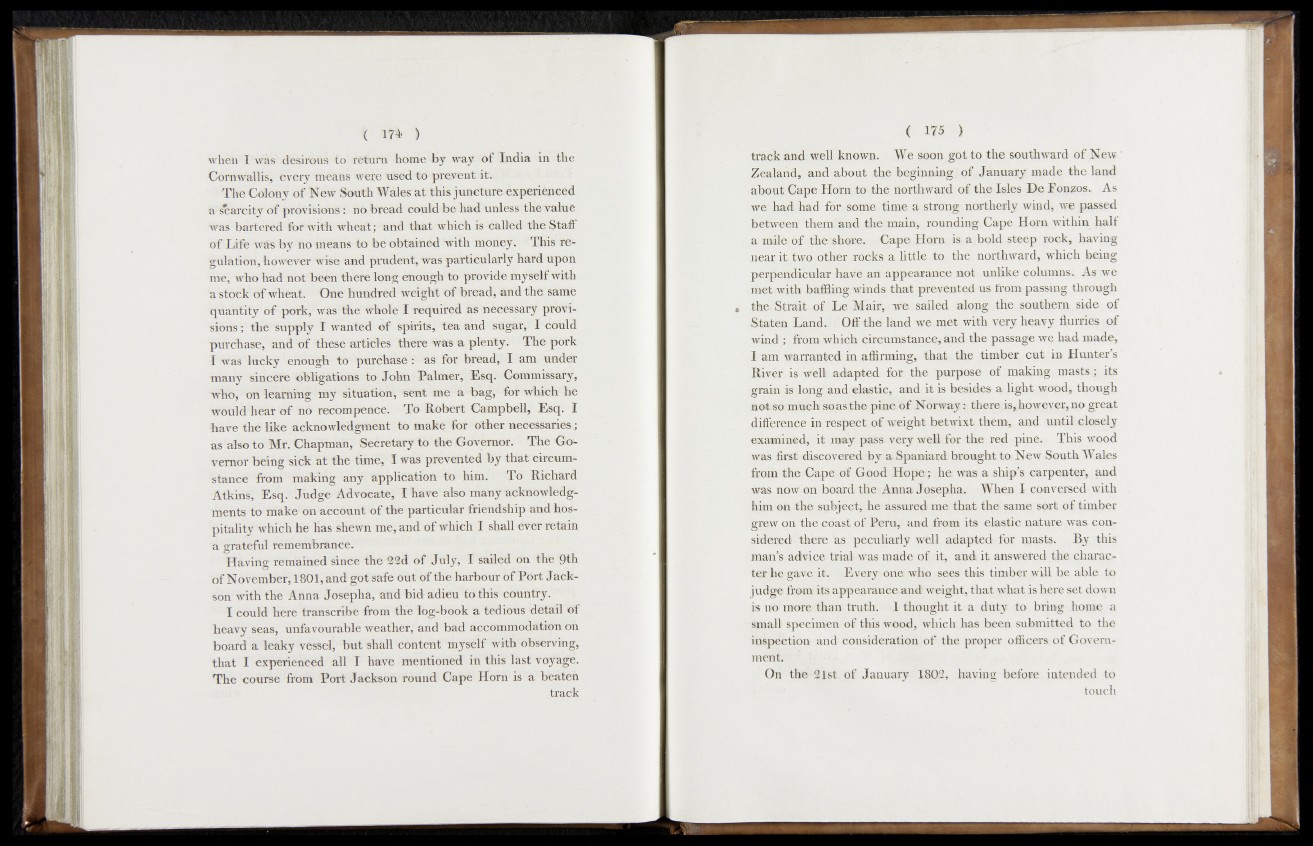
i m )
when I was desirous to return home by way of India in the
Cornwallis, every means were used to prevent it.
The Colony of New South Wales a t this juncture experienced
a scarcity of provisions: no bread could be had unless the value
was bartered for with wheat; and that which is called the Staff
of lif e was by no means to be obtained with money. This regulation,
however wise and prudent, was particularly hard upon
me, who had not been there long enough to provide myself with
a stock of wheat. One hundred weight o f bread, and the same
'quantity of pork, was the whole I required as necessary provisions
; the supply I wanted of spirits, tea and sugar, I could
purchase, and o f these articles there was a plenty. The pork
I was lucky enough to purchase: as for bread, I am under
many sincere obligations to John Palmer, Esq. Commissary,
who, on learning my situation, sent me a bag, for which he
would hear o f no recompence. To Robert Campbell, Esq. I
have the like acknowledgment to make for other necessaries;
as also to Mr. Chapman, Secretary to the Governor. Hie Governor
being side a t the time; I was prevented by that circumstance
from making any application to him. To Richard
Atkins, Esq. Judge Advocate, I have also many acknowledgments
to make on account o f the particular friendship and hospitality
which he lias shewn me, and of which I shall ever retain
a grateful remembrance.
H a v i n g remained since the 22d of July, I sailed on the 9th
of November, 1801, and got safe out of the harbour of Port Jack-
son with the Anna Josepha, and bid adieu to this country.
I could here transcribe from the log-book a tedious detail of
heavy seas, unfavourable weather, and bad accommodation oh
board a leaky vessel, but shall content n^self with observing,
th a t I experienced all I have mentioned in this last voyage.
The course from Port Jackson round Cape Horn is a beaten
track
( US )
track and well known. We soon got to the southward of New'
Zealand, and about .the beginning. of January made the land
about Cape Horn to the northward of the Isles De Eonzos. As
we had bad &C:s©®iife time a strong northerly wind, we passed
between them arid the main, rounding Cape Horn within half
a mile-of the shore. Cape Horn is a bold steep rock, having
near it two other rocks a little to the northward, which being
perpendicular have ad appearance mot unlike cpfomns. As we
met with baffling winds: that prevented us from passing through
the Strait of Le Mair, we sailed along the southern side, of
Staten Land.! i^Off the land we met with very heavy flurries of
wind ; | from which circumstance, and the passage we had made,
I am warranted in affirming, that the timber c u t in Hunter’s
River is well adapted for the purpose of making masts ; its
grain is long and elastic, and it is besides a light wood, though
noitsdmnaeeh) sp as the pine, of Norway: there is, however, no great
difference in respect of weight betwixt them, and until closely
examined, it may pass very well for the red pine. This wood
was first discovered by a Spaniard brought to New South Wales
from the Cape of Good Hope ; he. was a ship’s carpenter, and
was now on board the Anna Josepha. When I conversed with
him on the subject, he assured me th a t the same sort of timber
grew on the coast of Peru, and from its elastic nature was considered
there ‘as peculiarly well adapted for masts. By this
man’s advice trial was made of it, and i t answered the character
he gave it. Every one who sees this timber will be able to
judge from its appearance and weight, that what is here set down
is no more than truth. 1 thought it a. duty to bring home a
small specimen of this wood, which has been submitted to the
inspection and consideration of the proper officers of Government.
On the 21st of January 1802, having before intended to
touch